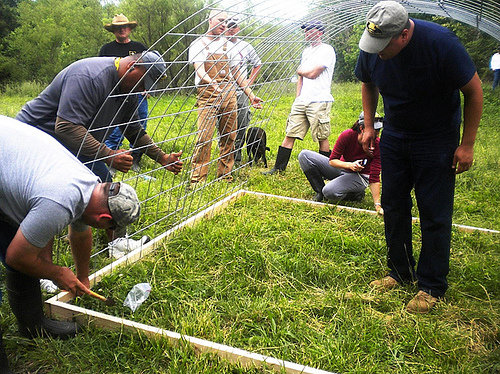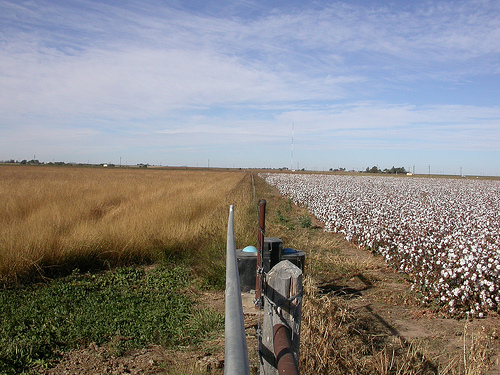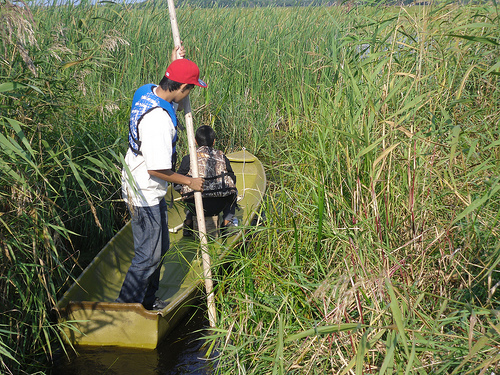It’s shaping up to be a good year for students in Indian Country.
For the first time in school history, students at Saginaw Chippewa Tribal College in Mount Pleasant, Michigan can register to take physics thanks to an upgraded laboratory. And at Leech Lake Tribal College in Cass Lake, Minnesota, students were able to take trigonometry for the first time last year. Funded and supported by USDA’s National Institute of Food and Agriculture (NIFA ), both schools made improvements to bolster their students’ learning in the areas of science and mathematics.
NIFA’s Tribal Colleges Education Equity Grant is a noncompetitive program that enhances educational opportunities for American Indians in the food and agricultural sciences. These grants strengthen formal educational opportunities at the associate, baccalaureate, or graduate level at 1994 land-grant institutions, also known as tribal colleges. Read more »
Farmers are the ultimate survivors. By definition, their work requires incredible planning, but it also requires creativity. This year, farmers have faced the test of limited summer rains, which have lowered the productivity of many farmers’ yields. With fall approaching, farmers have an opportunity to invest today for better outcomes next year by planting what are called “cover crops.” Not harvested like a main crop, cover crops are mowed to stay on top of the soil or disked in for soil improvements.
Cover crops offer a wide range of benefits: they “trap” nitrogen left behind by fertilizer in the field, which otherwise may be washed away over the winter. They conserve water, improve the quality of soil, suppress weeds, and control insect pests and erosion. Cover crops can also provide an excellent source of animal feed during periods when drought has reduced forage.
USDA science counts conservation research as an important area, so our scientists continually study cover crops, including timely focus on the impacts of drought stress to reduce potential losses in U.S. production capacity. Using a grant provided by USDA’s National Institute of Food and Agriculture, researchers at Purdue University show that cover crops left on the soil surface after germination in spring will conserve soil moisture acting as a soil cover. This can increase crop yields in dry years and reduce year-to-year variability in yields. Read more »

Military veterans-turned-beginning-farmers learn how to build mobile poultry units at an Armed to Farm workshop. Photo credit: University of Arkansas
For many military veterans and their families, the transition from the military to civilian life is a complex undertaking; however, reports and personal accounts indicate that many military veterans have discovered that farming offers a place for employment, training and healing. The problem is there are few educational programs tailored to meet the particular needs and abilities of returning veterans.
The National Institute of Food and Agriculture’s (NIFA) Beginning Farmer and Rancher Development Program (BFRDP) makes it possible to fill that gap in training. At the University of Arkansas, Dr. Dan Donoghue used BFRDP funds to develop internships, workshops and online courses that focus on the needs of veterans interested in pursuing farming after their service to our country. Read more »

Grass and cotton fields in the Texas High Plains study. Credit: Vivien Allen (Texas Tech University).
This post is part of the Science Tuesday feature series on the USDA blog. Check back each week as we showcase stories and news from USDA’s rich science and research profile.
Words like eco-friendly, green, fair, climate-friendly, community-based and organic are popping up daily – in the news, in ads and labels, and in conversations ranging from kitchen tables to international conferences. All of these and more come under the umbrella of sustainability, which people often describe as caring for people, planet and proceeds all at the same time. Read more »

American Indian youth ricing. The Leech Lake Band of Ojibwe rely on water to preserve their culture, their agriculture and their overall quality of life
When Leech Lake Band of Ojibwe water resource professionals discovered that 60 percent of the Minnesota reservation’s septic systems were sub-standard or failing, they feared for the reservation’s health, indigenous rice fields, and fish populations.
Shirley Nordrum, a Leech Lake Extension educator with the University of Minnesota, responded with an extensive education program. She explains to homeowners how having the sanitation department pump their septic systems could protect their health and contribute to the safety of the environment and their community. She uses funds from U.S. Department of Agriculture’s (USDA) Federal Recognized Tribes Extension Program (FRTEP) to conduct this outreach effort. Her program has become a model for other communities. Read more »
Evelyn Eagleman, 63, remembers driving the long distance off Rocky Boy’s Indian Reservation, Mont., to rescue her grandson when he was two. His father was serving in the military and his mother had been arrested on drug charges. The boy needed a new start.
She brought the child home to Rocky Boy, where she and her husband, Francis, became the child’s foster parents. Her grandson, now a teenager, will soon graduate from high school and plans to major in forestry in college. Eagleman said she and her husband are proud of the man he has become and gives much credit to the Grandparents Raising Grandchildren program at Stone Child College, in Box Elder, Mont.
“There are a lot of legal issues involved with foster parenting, and I can’t remember them all, but with this program, I know where to go for help,” she said. “We learned about our rights as foster grandparents.” Read more »



